- Army
- Conflicts in the world
- Israel - Iran conflict 2025
- Pakistan - India Conflict 2025
- Russia Ukraine War 2022
- Libya conflict day by day
- HAMAS - Israel War 2023
- Operation Serval in Mali French Army
- Sangaris operation Central African Republic
- Sangaris opération militaire République Centreafrique
- Ukraine - Russia conflict
- Syria conflict news
- Defence & Security Industry Technology
- Armies in the world
- Analysis Defense and Security Industry
- Conflicts in the world
- Navy
- Air
Analysis Russian military forces deployed in Syria offers victory for stabilisation in Middle East? TASS 10903162
|
|
|||
|
The conflict in Syria
|
|||
|
|
|||
| Analysis: Russian military forces deployed in Syria offers victory for stabilisation in Middle East? | |||
|
The media have pronounced the Syria truce agreement, cosponsored by Washington and Moscow, as the latter’s big diplomatic success. Actually, it does not seem to be a success at all. It is quite possible that Moscow has made a grave mistake - both militarily and politically, Institute for Political and Military Analysis Deputy Director Alexander Khramchikhin presumes.
|
|||
|
|
|||
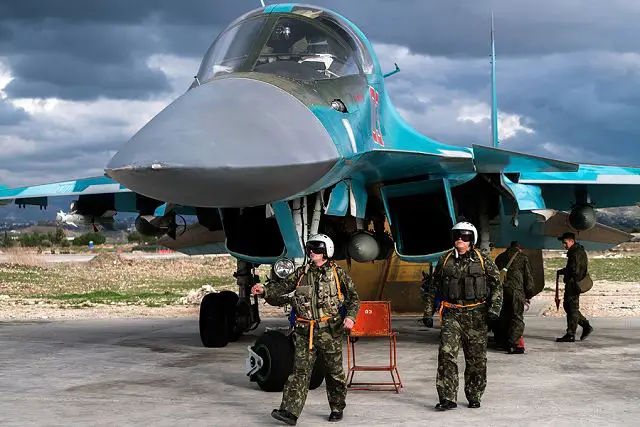 Russian ASF at the Hmeymim airbase in Syria Russian ASF at the Hmeymim airbase in Syria |
|||
|
|
|||
|
Russia’s sole objective in Syria should be al-Assad’s regaining of total control of the country and providing of the Kurds with broad powers of autonomy. This option alone would resolve a key problem - elimination of radical Sunni Islam’s breeding ground, from which aggression against Russian would bound to begin in the near future. At the same time, this would considerably facilitate Moscow’s consolidation of its Middle East positions owing to the emergence of a definitely pro-Russian country in the region. The "unholy trinity" of al-Assad’s opponents - the West, Turkey and Persian Gulf monarchies - would have to swallow it. The most effective policy is total military victory, with which all malcontents have to put up. To attain the objective, Russia has used its only competitive edge available now - its military might. However, Moscow has suddenly decided to give up its only essential objective and its only competitive advantage.
Just as soon as the Syrian Army supported by Russian aircraft has finally transitioned from tactical-level victories to significant success on the operational level, the "progressive community" resumed its familiar howl about the "suffering of civilian population" (until then, the "progressive community" had hoped for al-Assad to fail even despite Russia’s assistance and had not been worried about the civilians that much). It goes without saying that the truce will benefit only and exclusively the losing side by preserving the patchwork on the ground in Syria’s west, Alexander Khramchikhin says with confidence. While the "Islamic Caliphate" in eastern Syria occupies a more or less continuous area, the rest of the groups opposing al-Assad in the northwest, southwest and center of the country are intermingled in a hodgepodge fashion. |
|||
|
|
|||
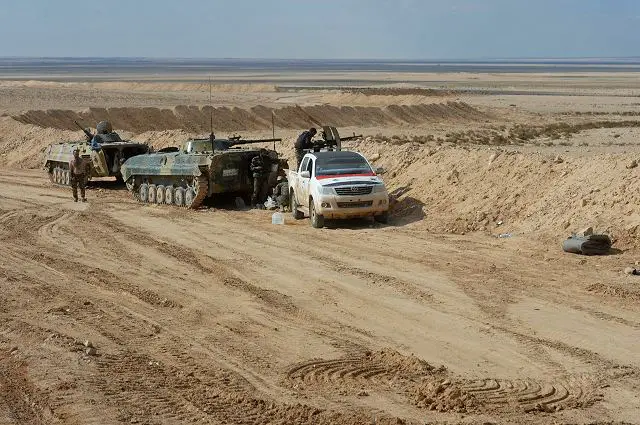 Syrian Arab Army soldiers on combat position near the city of Palmyra (© SPUTNIK/ MIKHAIL VOSKRESENSKIY) Syrian Arab Army soldiers on combat position near the city of Palmyra (© SPUTNIK/ MIKHAIL VOSKRESENSKIY) |
|||
|
|
|||
|
It is impossible to tell "good guys" from "bad guys" there in either political or military terms, the expert believes. Even if Washington and Moscow somehow come to terms on which opposition groups are "good" and which are "bad" and would delineate their areas as of now, future development are hard to predict. Even though they are at daggers drawn now, the "good" and "bad" opposition groups will quickly agree on pulling off a provocation designed to portray their common enemies - Damascus and Moscow - as the truce breakers.
Washington has already said openly and honestly that Damascus and Moscow will bear responsibility for any violation of the truce no matter who commits it. Moreover, additional sanctions are almost bound to be imposed on us for our involvement in Syria. This is especially important to Washington because of the EU’s growing desire to lift the sanctions it slapped on Russia for its stance on Ukraine, for which many European leaders have called. We will have to blame for the problems only ourselves yet again, because one should not play cards with cardsharps, i.e. anyone of the aforesaid "unholy trinity". Moscow has already come to grief with Turkey, but continues on the same lines with the West and Persian Gulf monarchies, Alexander Khramchikhin opines. It looks increasingly suspicious that the Kremlin needs both the Minsk agreements and Syrian truce for only one reason - to stop Russia’s "international isolation" and display that the "international community" reckons with it and treats it as a key player, while the practical effect is less important at best. It is this way that Moscow’s "diplomatic success" is positioned, the expert presumes. |
|||
|
|
|||
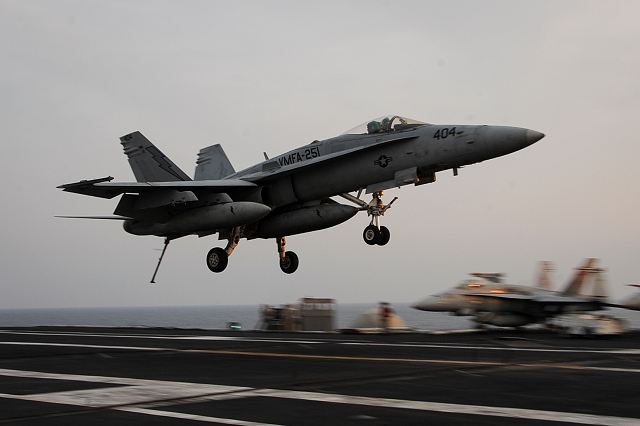 An U.S. F/A-18C Hornet lands on the flight deck of the aircraft carrier USS Theodore Roosevelt deployed in the U.S. 5th Fleet area of operations supporting Operation Inherent Resolve, strike operations in Iraq and Syria. (Photo US Navy) An U.S. F/A-18C Hornet lands on the flight deck of the aircraft carrier USS Theodore Roosevelt deployed in the U.S. 5th Fleet area of operations supporting Operation Inherent Resolve, strike operations in Iraq and Syria. (Photo US Navy) |
|||
|
|
|||
|
The policy is grounded in the acutest complex of inferiority vis-·-vis the West (the anti-Western hysteria by most of the Russian media is actually a graphic example of this complex), the expert asserts. Unfortunately, we continue to equate the West and the international community (or "civilized world"), though it is wrong in any respect. Just because it is wrong, Russia has never been in "isolation". However, the Kremlin continues to penetrate the nonexistent "isolation", only forcing itself into a corner. It is high time to realize that the West will not recognize us as "one of the lads" on either our or its own terms. It high time for us to stop busting our gut trying to "break on through to the other side", varying only the types of the "breakthrough".
The best policy is a military victory producing peace on the victor’s terms, rather than a useless truce. NATO has turned itself into a paper tiger in military terms, incapable of fighting in earnest, Alexander Khramchikhin says with confidence. It is this fact that has afforded Russia the key advantage - the military one that should be put to use by fighting the war in Syria to a triumphant conclusion. Right, a military conflict with Turkey - Turkey, not NATO that will by no means fight Russia - has become quite probable. There should be no chest thumping as far as the prospects of a war on Turkey and Gulf monarchies are concerned - it has become too wide-spread in Russia - but there should be no alarmism either. Naturally, it would be very hard for the Russian task force in Syria and al-Assad’s army to stand their ground against a full-scale Turkish invasion or survive a massive air attack of the Turkish Air Force. One should keep in mind that the S-300 and S-400 (NATO reporting names: SA-10 Grumble and SA-21 Growler) air defense missile systems and Sukhoi Su-30SM and Su-35 (Flanker-C and Flanker-E) fighters deployed in Syria have a limited stockpile of weapons and, therefore, the Turks, especially supported by the Saudis, can overwhelm our air defences by sheer numbers even at the cost of heavy aircraft losses. Turkey also enjoys the overwhelming superiority in ground forces. However, it is clear that an attack on the Russian troops in Syria is the same as declaring war on Russia, in which case Turkey will get a response both from the sea and from Russia. Given the geopolitical situation in the region and the disposition of the forces, there may be a war between two coalitions at the most. One would consist of Turkey, Saudi Arabia, Qatar (maybe, some other Gulf monarchy), Georgia, Azerbaijan, all anti-governmental groups in Syria and, certainly, Islamic Caliphate. The other would comprise Russia, Iran, Armenia with the Nagorno-Karabakh Republic, Abkhazia, South Ossetia, Syrian Army and allied groups in Syria, Iraqi Army and Shiite groups in Iraq and the Kurds as well. |
|||
|
|
|||
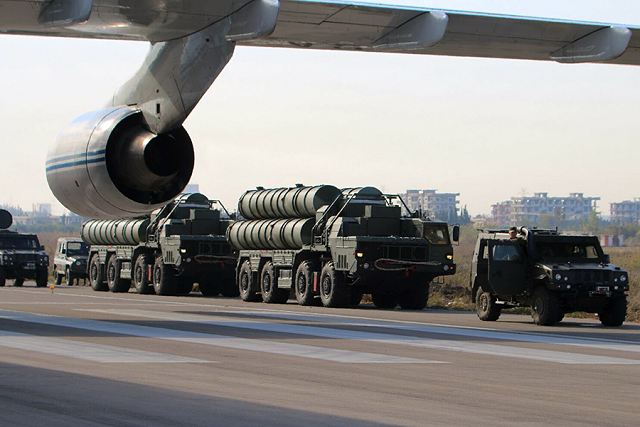 Since November 2015, Russian armed force has deployed S-400 air defense system in Syria. Since November 2015, Russian armed force has deployed S-400 air defense system in Syria. |
|||
|
|
|||
|
The war would not be a cakewalk but the victory of the latter coalition is far more likely, while the intervention of NATO in support of its full member, Turkey, is out of question. Even the United States are not ready for a large-scale war with heavy personnel and materiel losses, while a war like that is out of question to the Europeans no matter what. Moreover, the alliance will hardly dare to supply arms to Turkey and Gulf monarchies in the course of the war. By enduring the war, Russia would run NATO’s second-largest military into the ground, having again highlighted the insignificance of the alliance. It would crush the bulwarks of international Sunni terrorism (Saudi Arabia and Qatar) and get a bonus in the form of an oil price hike. If the Turks and Saudis do not risk a direct invasion of Syria, what will prevent us from keeping on fighting there?
Freezing the war will be more burdensome to Russia in financial terms than winning it, because in the former case, the task force deployed in Syria will have to remain there for a longer period. For some reason or other, the Kremlin is giving up victory for continued fighting. If it will stop halfway, which is the case with the truce, it will enable its opponents to use their advantages - the economic and media ones - against it. Recognition of Russia as a key player is not on the agenda at all, Khramchikhin believes. On the contrary, its opponents are learning their lessons and will do their best to minimize Russia’s role and to isolate it at the least. Moscow seems to have big problems with learning lessons, the military expert presumes. Sure, the truce may be used for defeating the caliphate in a speedy manner, but this will postpone a resolution of the Syrian problem at best. It is hard to fathom a truce turning into a full-fledged political process, considering the bitter hatred of the belligerents (mutual hatred is always much stronger in civil wars than in wars between states), but it is much easier to imagine the above-mentioned provocations - they are virtually guaranteed. Moreover, provocations will become an objective of the opposition and its foreign sponsors, because Moscow and Damascus may now be portrayed as aggressors and some more sanctions may be slapped on them. For these very reasons, al-Assad and his allies will have to keep considerable forces in the west of the country, thus being unable to use them against the caliphate. Besides, even though the truce is holding in part, the patchwork situation makes all of its parts (both those controlled by al-Assad and those by "good" opposition groups) inviable, which in itself creates conditions for the resumption of the hostilities. A similar situation in in Ukraine, where the conflict has been on hold artificially, though neither of the belligerents had attained its political and military objectives, according to Alexander Khramchikhin. Syria’s economic revival will be feasible only after it becomes a single state again. If the status quo persists, all of its parts will be fully dependent on foreign assistance. It is hard to regard this as ‘a success of the peace process’ somehow. |
|||
|
|
|||
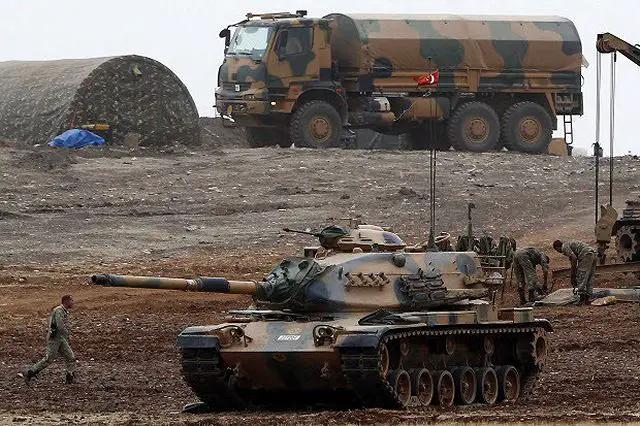 Turkish army tanks mechanized units take position on top of a hill near Mursitpinar border crossing (Photo:Canada) Turkish army tanks mechanized units take position on top of a hill near Mursitpinar border crossing (Photo:Canada) |
|||
|
|
|||
|
There are numerous forces and groups in Syria, with all of them fighting one another with rare exception. However, there should be two warring party to a war in the long run. The true enemy of the whole of Syrian opposition and its backers in the form of the "unholy trinity" is al-Assad. Their only objective is to topple him. Hence, the caliphate is an ally of this bunch, rather than an enemy (in this connection, numerous statements by various officials about "the need of joint fighting against terrorists" look like an undisguised farce). Ankara has admitted it through the chief of its intelligence service, Hakan Fidan, who called for immediate cooperation with the caliphate against Russia.
Moreover, the Turkish military has begun to cooperate with the caliphate, in fact (against the Kurds in Syria’s northeast so far), having done that after the truce was declared. Thus, the Turkish forces started fighting for the caliphate on a limited scale for now, while Washington, which had piled the responsibility for the failure of the truce onto al-Assad and the Kremlin, promised problems as part of its Plan B to them, rather than the caliphate. The Americans were joined by the Saudis who already spotted truce violations by Russian and Syria and threatened a Plan B of their own too. Naturally, the "moderate opposition" complained to the United Nations of the truce’s violation by Russia and Syria on the second day of the truce. Therefore, Damascus’s and Russia’s attempt at maximizing the forces used against the caliphate will only speed up a stab in their backs by both the "good" and "bad" opposition groups, and nothing else can be expected, the expert assumes. Therefore, one should not harbor illusions: the truce will not tip the scales in our favor, rather the other way round. We shall see it very soon. Wondering, how many similar errors will it take for us to learn from them, the deputy director of the Institute for Political and Military Analysis asks himself a question. |
|||
|
|
|||
| © Copyright 2016 TASS. All rights reserved. This material may not be published, broadcast, rewritten or redistributed. | |||


























